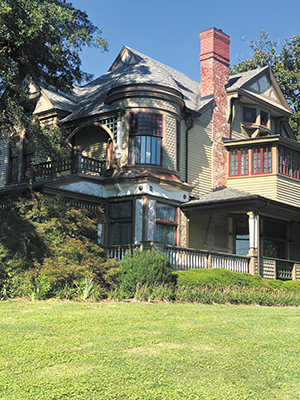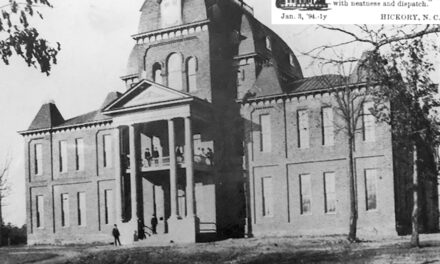
Last week, John Rutherford, Jr. and the college he endowed in eastern Burke County was the subject. This week we turn to the woman he married, who also had a great impact. Her name was Elizabeth Camp Denison, and what an important, and quotable individual she was to the area.
Perhaps her best statement was her own succinct biography. “I married, first for love, second for money and the third time, for the hell of it.” She sure did. Born in Sackett’s Harbor, on the western end of New York state, a little town on the shores of Lake Ontario, her first husband was his second wife. Arville Jennings was a US Attorney for the eastern district of Arkansas, a widower. If her statement is to be believed she fell in love with him and became stepmother to his children. That was sometime just before the Civil War. However, a year after the war was over, Mr. Jennings was dead. Elizabeth returned to her family in NY.
One day, reading the paper, she saw an advertisement in the paper. A man in North Carolina needed an “elocutionist” (which means someone who can read aloud clearly) to help him since his dimming eyesight had robbed him of the ability to read. The aging man was John Rutherford, the man who owned the land still known as Bridgewater in eastern Burke County. Elizabeth answered the ad, came south and began a ten year relationship with Rutherford. She even married him, which may have been the implicit request in the ad.
Rutherford was forty years older than her and when he died, he left her a very wealthy woman. For the ten years of reading and companionship, John Rutherford left his wife a sum of $80,000 in his will. That 1880 money would roughly translate to over $2mil in today’s economy. Also, Bridgewater belonged to her.
Heading to Washington, DC to visit her sister, Elizabeth Camp Jennings Rutherford met what would become her third husband, Colonel Marcellus Eugene Thornton. He was a lawyer, journalist turned bureaucrat for the national government. It was a whirlwind courtship, but she did not completely lose her head over the sweet talking Georgian. Prior to the marriage, Mrs. Rutherford required that Mr. Thornton sign what we would call a prenuptial agreement, guaranteeing that he could not claim the money she inherited if the relationship did not work out. Smart move on her part to hold onto her power.
The couple returned to North Carolina. They bought the old Shuler home (the one we now know as Harper House) and intended to take up residence in Hickory. However, the lack of a clear title, given the way Shuler left his financial situation with his untimely “demise” in 1890, kept the transfer of ownership for over six years. Eventually, Mr. and Mrs. Thornton moved in and their impact was substantial.
From just her marriages, Elizabeth was a woman well beyond her times. While women often married multiple times, especially to widowers, her encounters with wedlock were extraordinary. In her second and third attempt, she went from a man significantly older to one who was 18 years her junior. What a wild ride that must have been.
Though the age in which she lived expected women to be subservient, she clearly was not. Next week, a look at her third husband, Mr. “for the hell of it.”
Photo: The home purchased by Elizabeth Thornton in Hickory, now known as Harper House.









